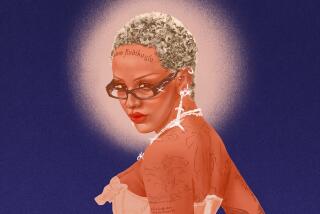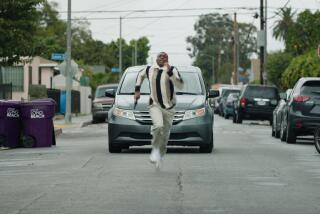YO! VH1 Raps?
- Share via
Is VH1 in danger of falling behind the music? That may depend on how the thriving music channel answers the biggest challenge on its horizon: the hip-hop question.
The mood in the boardrooms of VH1 has been understandably giddy these days. After all, as the network celebrates its 15th anniversary this year, it has gone from a cable afterthought to a certifiable brand name, and continues to post record audience numbers. But there is also a measure of uncertainty as its leaders try to sort out how--and when--hip-hop and rap will figure into its ever-changing playlist.
“I honestly don’t know what the answer is,” says Tom Freston, chairman-CEO of MTV Networks, the corporate parent of VH1. “How we come to grips with it, I don’t know. I do know it’s going to begin to happen. . . . Hip-hop was a real flash point for the generation coming into our [audience demographic].”
While the network first established itself as the music video stronghold for baby boomers, it has taken great pains not to gray with that audience. Instead, it has subtly reinvented itself each year to resonate with the newest arrivals in the coveted demographic of 25- to 34-year-olds that forms its core viewership. That explains why, for example, the Foo Fighters and other Gen-X stalwarts have replaced Rod Stewart and the Beatles as playlist staples.
But at the same time, VH1 also wants those older viewers to remain on board to see the BMW and American Express ads. The channel’s balancing act has been helped by the common ground sound of rock music--after all, the sonic gulf between Eric Clapton and the Dave Matthews Band is not a vast one.
Things are about to get more difficult, however.
The next few crops of VH1’s key audience age groups that will “graduate” from sister network MTV’s age strata will bring with them a very different musical heritage. These will be the fans who grew up as the hip-hop generation, loving LL Cool J, Public Enemy, Dr. Dre and the Beastie Boys. And, VH1 leaders acknowledge, rap music can be a jolting prospect for a network aiming to unite music generations.
One VH1 official called rap a “polarizing” sound for many current VH1 viewers, and in interviews executives were inconsistent in their view of whether the genre’s videos would become automatic additions to the VH1 selections in the years to come.
But John Sykes, the channel’s president, says he is confident the hip-hop sound is in tune with the network’s future.
“As someone who bought Run-DMC and Dre albums comes into the VH1 demographic, that music will become part of the VH1 music mix,” Sykes says. “We welcome it. We don’t want to stay the same.”
Sykes and his lieutenants were new at the helm of VH1 six years ago when they jettisoned a burnished but sleepy adult-contemporary sound and comedy shows in favor of a cerebral mix of documentaries, songwriter-flavored features and an emphasis on veteran artists offered in live settings.
The channel also launched “Save the Music,” a high-profile charity campaign to fund public school music programs that has raised millions and enlisted the help of another baby boomer rock advocate--President Clinton.
VH1 Dramatically Revives Its Ratings
Led by flagship shows such as “Behind the Music,” “Storytellers” and the pithy “Pop-Up Video,” VH1 has built its cumulative monthly ratings to 74 million viewers, up dramatically from the 24 million before the relaunching.
“It was a train wreck as far as ratings before Sykes came in,” says Ed Martin, editor for programming coverage at the Myers Report, a marketing industry trade publication. “Now it’s the leading basic cable network for 18- to 49-year-olds, the most sought-after demographic within the advertising community.”
The niche inhabited by VH1 sometimes blurred with MTV in the ‘90s when U2, R.E.M. and other rocks acts found a home on both, but as MTV’s fare turned first toward hip-hop and more recently to youth-pop, there was “less overlap than ever,” Freston says, “and that has helped both.”
That said, isn’t there a temptation to keep the barriers in place and have VH1 focus on the music that has made it a touchstone for boomers and young adults? Not an option, Sykes says.
“If we followed the veteran artists as they got older, there would be a hole there as people graduated from MTV,” Sykes says. “We’re in the business of constant reinvention.”
And to Martin, alienating older viewers may not even be an issue. “Will viewers in their 30s and 40s now even be watching a channel like VH1? I find it hard to believe a 55-year-old would sit and watch VH1 as it is today.”
Still, music fans are remaining vital consumers much later in life now than in previous generations, and the proliferation of media and online offerings may push that trend even further in the years to come. If that’s the case, Martin says there may be a raft of VH1 channels created to supply the specific genre or era of music that fans crave.
“Who can say what’s going to happen? But certainly, if hip-hop remains popular with today’s young listeners as they get older, you will see it on VH1,” Martin says.
Hip-Hop-Flavored R&B; Added to Mix
The network is already taking measured steps to explore hip-hop themes. Hip-hop-inflected R&B;, such as the music of Lauryn Hill, Macy Gray and TLC, has been easily mixed into its video selections, and in a nod to the growing celebrity of the rap world, Sean “Puffy” Combs was tapped to host the VH1/Vogue Fashion Awards last year.
As for harder-edged hip-hop, VH1 has taken an interesting tack by broaching the music first via the network’s flagship show, the long-form documentary series “Behind the Music.”
Dre, Run-DMC and rap impresario Russell Simmons have been recent subjects of the popular show, which last week aired its 100th episode. The 3-year-old show, which airs daily, has become a hit with its serious tone and emphasis on rock-star tales marked by tawdry subplots, binges and excesses, creative controversy and careers that end with a dazzling implosion or inspirational resurrection. The world of rap is clearly ripe with fodder for the show, and the take on Dre is already among the most successful to date.
Drama isn’t the only reason for tapping rap for “Behind the Music.” The forum, VH1 officials say, also lets older viewers get acquainted with hip-hop notables they may only be vaguely aware of, and it also draws in younger viewers who may not flip over from MTV to hear about Cher’s assorted comebacks, but are interested in Eminem’s mentor, Dr. Dre.
What about the boomer viewers who wax nostalgic for Woodstock but have no idea what exactly a Wu-Tang Clan is?
For them, VH1 has launched a new digital cable channel called VH1 Classic to feature the Who, Elton John, Smokey Robinson, the Beatles and other seasoned music that has been all but excised from the main channel. It has a limited audience potential, however, reaching only about 1 million homes.
The true VH1 future, Freston says, is the main channel, its use of the Internet and--there’s that nettlesome issue again--finding a way to make the sounds of hip-hop beat boxes mesh with acoustic guitars.
“It’s kind of frustrating, frankly,” Freston says with a chuckle. “When you think you’ve got it just right, you have to redo the whole channel.”
More to Read
The biggest entertainment stories
Get our big stories about Hollywood, film, television, music, arts, culture and more right in your inbox as soon as they publish.
You may occasionally receive promotional content from the Los Angeles Times.










